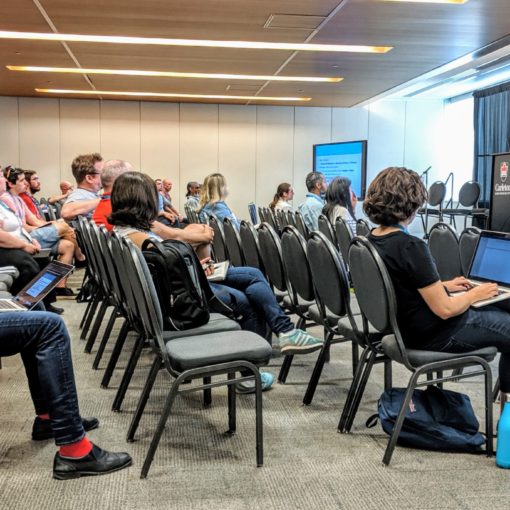I went to this job fair in December 2019. The job fair was for teachers who want to teach in international schools around the world. I wasn’t sure what to expect as I don’t have a teaching degree and in the majority of cases, don’t qualify for the position. However, there are some people and schools out there that place value on depth and breadth of knowledge in a particular subject first, rather than certification. We’ll look at attitudes towards education here in Canada and abroad.
I went to this job fair with an open mind to observe, listen and learn about what is out there in the world of international education. There were presentations and talks from school administrators at schools in countries all over the world, Asia, South America, the Middle East, Europe. While I have never studied in these countries, I have studied with people from all over the world including people from every continent. One of the advantages of studying a science and language like mathematics, it is global. Something I learnt from studying with students from all over the world, is the respect for education, educators and the responsibility I have in the education process, being the best learner I can possibly be.
Teaching
One particular presentation at the job fair resonated with me. It was a presentation from one of the senior administrators for a private school board in China, the Canadian International School Beijing, China. There were a few interesting things he said. He is from New Brunswick, Canada and has been a teacher for over 42 years. 34 of those years have been spent teaching abroad, the last 10 in China. He told us a story of one of his colleagues from New Brunswick, Canada going to China to teach for a couple of years and then returning home. When he returned home, he was asked, how teaching was different in China. His response was, “You can’t teach here [Canada].” That seems confusing. If you’re a teacher, and you have a classroom of students, aren’t you teaching? He explained what he meant by “You can’t teach here [Canada].” Most of us have some experience with the Canadian school system either from personal experience of second hand through our children. As he explained, here, in a 55 min class, 15-20 mins is spent getting students settled, doing administrative things and overall general discipline to get the student reading to learn, so no actual teaching. By the time the classroom and students are ready to be taught, there is only at best, 40 mins left to go through the lesson. Every minute counts when teaching new ideas. Misusing a single minute means less time to explain and expand on new ideas in the classroom. However, in the Chinese school, the students came to class eager and ready to learn. They came settled, disciplined, ready and eager to be taught. This saved the teacher time who now had more of the 55 minutes to spend teaching.
I am not a teacher, but an awakener.
Robert Frost
Being the best learner
Another point that was mentioned was about competition. Here the majority of students want to better than the people in their class, grade perhaps school. Maybe there are some that want to be better that everyone else in the city. They are competing with the people around them from a small population. Once that has been achieved, the competition is over. However, the students in China and in these international schools, recognize that they are completing against the world and ultimately against themselves, so that they can be the best they can be at all times. They are constantly working on improving, growing and learning. Their mindset is different. This different mindset may be due to various reasons, parents, family, teachers, environment, who exactly knows. But, these students are in an international school with students from families that travel and move around and as a result these students will have opportunities to study at top universities anywhere in the world. This itself, creates a different reality for the students, the reality that, if they want to get into a university in another part of the world, let alone the top university in another part of the world, they have to be better than other people from anywhere in the world. That’s a much larger population to compete against than just you school, city or province. Having a classroom of student with this drive to compete against yourself to be better, makes a big difference when you are teaching.
The capacity to learn is a gift; the ability to learn is a skill; the willingness to learn is a choice.
Brian Herbert
Skill and Drill in education
Many of the students in other countries, in particular, Asian countries, continue their studies after school hours. Not just through homework and tutors but by going to independent private schools to further the studying and learning. So they are going to school even after they have finished school. That’s dedication, both on the student’s part, but also on the parent’s part in investing in their child. This after school education in private schools at night or on weekends is referred to as “skill and drill”. This investment in “skill and drill” has created generations of people that are incredible reservoirs of factual knowledge to the point that they can receipt material word for word. Very impressive and can get them quite far but that creativity and imagination used to do something with the factual knowledge besides just reciting it, is not as strong in these countries. This is where the creativity and imagination from other countries and the desire to learn how to use the facts in creative ways, is welcome. This brings us to learning systems and the implementation of different types of curriculums and learning methods.
You don’t learn to walk by following rules. You learn by doing and falling over.
Richard Branson
“Deep Learning” in education
I don’t know much about the learning methods and their systems. What I did understand is that there is more to teaching and learning in many of these international schools. The goal of these schools is not just to put information into the student’s head but to also involve them in the material. The “3 H’s: head, heart, hands.” The idea is to put the information into their head; get the students to use it wit their hands and experience it; and then it will stay with them forever, in their heart. Too much of what is taught in schools in that classrooms setting, with a teacher at the front and students sitting and listening is just putting information in their head and its usually stops there. It takes some time and a bit of effort to engage students enough so that they will want to get involved and get their hands dirty doing something with the knowledge in their head. Once they have done something with the material, it not becomes theirs, a memory, an experience in their heart.
Tell me and I forget. Teach me and I may remember. Involve me and I learn.
Benjamin Franklin
Growth
Another interesting difference between the education system here and there is at the parent teacher interviews. Here, when a student doesn’t do well the reaction from parents is, what is wrong with the teacher and education system. There is immediate reaction to blame others for the failings; blame the teacher; to decide that this subject isn’t for their child. A very limited and fixed mindset. But over there, the reaction from parents is, “Why can’t my child get 100% all the time?” The parents are asking what is wrong with their child, what can they do, what can be done to improve, become better, grow. There is respect for the educator and the educational system. The mindset in many of these international schools is very different. There is more of a growth mindset rather than a fixed mindset, but this is another post.
Life itself is your teacher, and you are in a state of constant learning.
Bruce Lee
One educational curriculum that is international and offered worldwide is the International Bacalaureate, IB, curriculum. You can learn more about this curriculum at ibo.org and we have some study resources for the IB math curriculum available to students.




